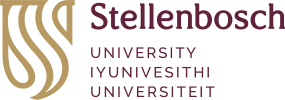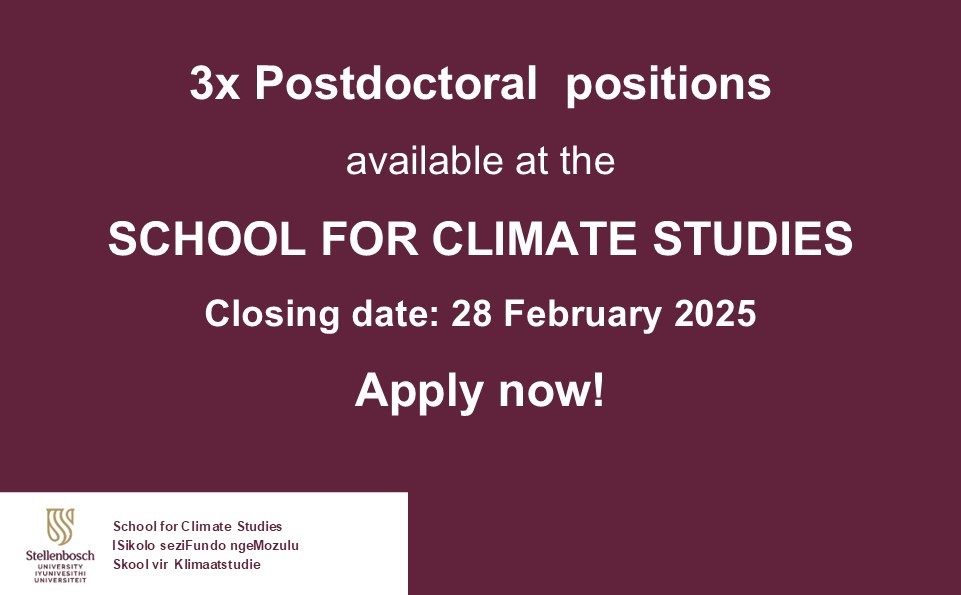The Southern Ocean Carbon-Climate Observatory (SOCCO) hosted by the CSIR and in partnership with the School of Climate Studies at Stellenbosch University is looking for postdoctoral candidates in ocean carbon- climate research.
1. Untangling the carbon-climate drivers of CO2 and heat flux variability and trends in the Southern Ocean
The global ocean has absorbed 26% of total CO2 emission and 90% of human generated heat with the majority being absorbed by the Southern Ocean (43% and 75% of CO2 and heat uptake respectively). Thus, understanding the future role of the oceans in influencing the rates of global warming depends critically on the sensitivity of its uptake and storage of heat and anthropogenic CO2 in the Southern Ocean. In this regard, there are two key research aims, which are strongly modelling and analysis based: 1) how sensitive are the reconstructed interannual and decadal trends of CO2 fluxes in the Southern Ocean to the changing spatial and temporal characteristics of the pCO2 sampling? and 2) how do climate forcing (e.g. momentum, heat and freshwater fluxes) and atmospheric CO2 forcing mechanisms independently and together influence the variability and trends of CO2 fluxes in the Southern Ocean?
2. Untangling the carbon-climate drivers of of CO2 fluxes in the Southern African coastal systems:
The Southern African coastal – ocean ecosystems are among the most energetic and productive systems in the global ocean and yet its CO2 variability is among the least observed and its CO2 physics – biogeochemical processes least understood. Here we aim to ask the high level question: what are the critical process scales of variability that explain the sensitivity of CO2 fluxes to changes in carbon and climate?
3. Machine Learning-based Reconstruction of CO2 fluxes the Southern African coastal system
Machine learning based reconstructions of CO2 fluxes are now the most widely used approach to obtain observations based constraints on the variability of CO2 in the ocean. However, while they have been widely used in the global ocean, their strengths and limitations in the scale and process constraints of the coastal systems is still an active research topic. Here we aim to address two gaps:
a. Use a ML-reconstruction approach to optimise coastal CO2 observing strategies that minimise the uncertainties of mean fluxes
b. Build a low uncertainty multidecadal reconstruction of CO2 fluxes in both the Agulhas and Benguela systems
4. Analysis of the effectiveness and feedbacks of marine carbon dioxide removal (mCDR) interventions in the Southern African coastal systems
Here we aim to undertake semi-idealised sensitivity analysis experiments using a high resolution coastal model to examine the sensitivity of different parts of the coastal systems to mCDR interventions and hence evaluate the risks, and possible feedbacks that could impact on the effectiveness of those interventions.
These opportunities will be jointly based at the School for Climate Studies, SU and at SOCCO, CSIR campus in Rosebank, Cape Town. For more information about SOCCO please see http://www.socco.org.za, @SOCCO_Science, Facebook: Southern Ocean Carbon and Climate Observatory.
Requirements
- A PhD degree within the realm of physical and biogeochemical oceanography/ earth system modelling obtained within the last 5 years.
- Experience with analysis of ocean models
- Machine learning experience would be advantageous
- Analyse and interpret data using statistical
- Ability to use a programming language for analysis and visualisation (e.g. Python)
- Willingness to collaborate with an interdisciplinary team to contribute to broader projects related to ocean climate science
- Publish research findings in peer-reviewed journals and present at
Applicants must attach the following documents:
- CV (highlighting relevant skills and experience)
- A cover letter
- Copies of academic transcripts, tertiary qualifications and tertiary qualifications and ID.
Please note that the selection committee reserves the right not to make an appointment.
For more information, contact Prof Pedro M. S. Monteiro (pmsmonteiro@sun.ac.za) or Dr Sarah Nicholson (sarahanne.n@gmail.com )
Closing date: 28 February 2025

